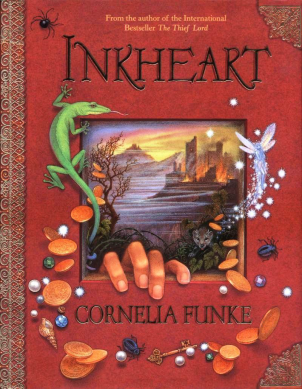
Selected stories and methodologies!
Title of Activity
Pantomime a story
Description of educational activity
Duration: 130 minutes
Pupils’ age: 15-19
Organization of the class of pupils: group work
The aim of the lesson: The aim of the lesson is to improve the reading literacy of the students. To improve their reading comprehension and to be able to find those ideas of the excerpts which will help them to mime their part of the excerpt so that they can put together the storyline.
Students will gain knowledge and understanding of identifying supporting details and examples in non-fiction, fantasy text.
Support materials:
Excerpt cut into five parts. Anything students can find to help them mime their part.
Excerpts from the book Inkheart: Chapter 56 The Shadow.
- Part 1: page 271 (In books hatred.......).....page 272 ( - and Meggie´s reading.)
- part 2: page 272 (Meggie felt...) ...page 273 ( ...the ticking)
- part 3: page 273 (A very fine speech… - Meggie obeyed.)
- part 4: page 273 (Hastily… )....page 274 ( ...fear.)
- part 5: page 274 (Meggie bent over the book … page 275 (.... in the wind)
Activities:
- The students are divided into groups of 4-5.
- Each group gets a part of the excerpt.
- The students have to read their part.
- Then each group works separately in a different classroom or any room where they practise miming their part of the excerpt.
- After practising members of each group mime their part.
- After seeing all groups students discuss what happened in each performance and try to put the storyline in the correct order.
- They have to justify their decision.
- Discussion: The students are enabled to interact, to discuss within the group, to argue for or against an opinion.
Evaluation and assessment method:
- Throughout the lesson, ensure that your students are backing up their choices with accurate supporting details.
- Teacher's observations of student preparedness, student work samples, and participation in group activities.
Effect of the activity on RSP reading: Practices that support students´ choice, collaboration, and shared control of learning outcomes can be linked to self-expressed interest in reading and engaged reading behaviours.Teachers can organize reading instruction to develop self-efficiency, competence, and engagement in teenage students.
Connection to curriculum
Grade: 2nd grade of bilingual studies
Bilingual curriculum: the study of literature is focused during the second year on reading comprehension of literary texts which are based on the interests of the students which involves fantasy, too. The aim of the curriculum is to teach students to work with the text, to analyse the texts. Understanding texts, weighing their merits, and utilizing the information they offer are skills that teenagers draw on throughout the curriculum.
Knowledge:
- Develop reading fluency
- Improve reading comprehension
- Organise information in a specific way
Skills:
- Use performing skills
- Distinguish reality and fantasy
- Make predictions
- Compare and contrast
- Summarize
- Work effectively in groups, respecting others
Competences:
- Make connections between fiction and real life or personal experiences
- Be able to visualise material read
- Follow specific instructions and conventions
- Evaluate evidence
- Support and justify an opinion
Bibliographic reference to be used during the activity
Cornelia Funke
Inkheart
Publisher: Chicken House Scholastic Inc.
ISBN: 9780439709101
Page count: 534
Year of issue: 2007

Results
The expected outcomes of the lesson are:
- The students will be able to understand the important parts of the excerpt which they will demonstrate by miming and subsequently to work out the storyline
- To connect ideas and themes across texts.
- To offer observations, make connections, speculate, interpret, and raise questions in response to the excerpts.
Recommendations
Both the teaching method and the text can help in increasing students’ interest in reading. This text promotes love towards books which can encourage students to read more. The teacher monitors the students so as to make sure they cooperate effectively.
The volume of given fragments of books can be adapted to the
potential of a group - fragments can be shorter - by cutting less important paragraphs, or be expanded to additional fragments of the same novel.
Contact
X gimnazija ''Ivan Supek''
Ul. Vjekoslava Klaića 7
10000
Zagreb
E-mail: partners@handbook4rspreaders.org










